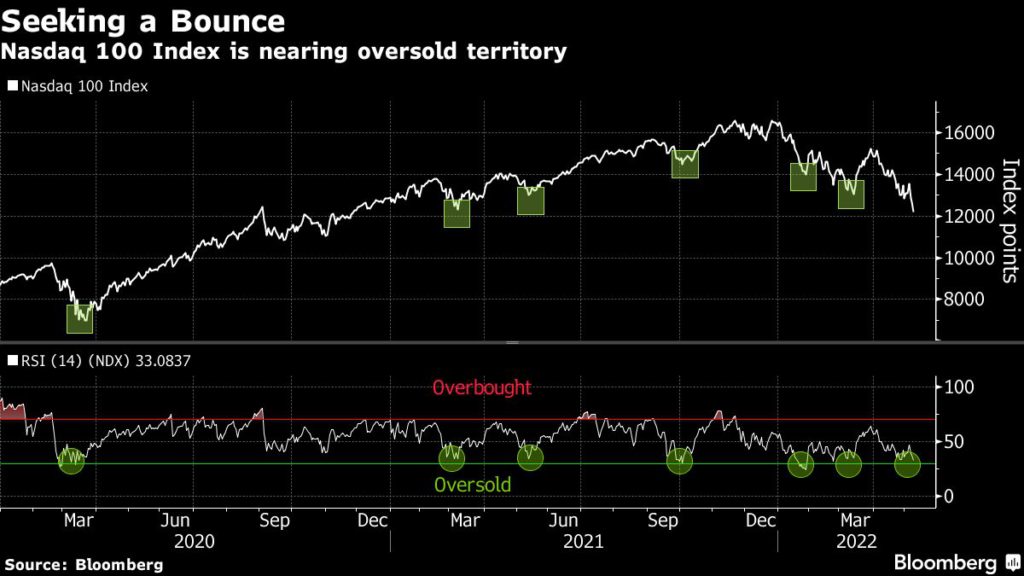(Bloomberg) — The rout in global equity markets that erased $11 trillion since the end of March may be reaching a floor for now as battered valuations, particularly among tech stocks, attract dip buyers.
For some, the argument rests on technical indicators, while others are looking at what corporates are offering, such as strong balance sheets and high dividend yields. Plus, investors have already priced in a lot of concerns, according to Peter Oppenheimer, chief global equity strategist at Goldman Sachs Group Inc., including about inflation and growth, central bank policy tightening and the war in Ukraine.
“Equities are starting to look attractive for medium-to-longer term buyers,” he told Bloomberg Television on Tuesday. While the downside risks still lurk, “all of that really is absorbed into the market already.”
European stocks rebounded on Tuesday, following another selloff across both sides of the Atlantic on Monday. The Stoxx 600 index was up 1.3% as of 1:30 p.m in London. S&P 500 and Nasdaq 100 futures pointed to a positive open for U.S markets, with the latter advancing as much as 1.8% as bargain hunters returned.
Amid concerns about how aggressively central banks will move, markets may also have taken some relief from Raphael Bostic, Federal Reserve Bank of Atlanta president, who said late Monday that he doesn’t support rate hikes bigger than 50 basis points.
The S&P 500 has fallen for four straight weeks, while the Stoxx 600 has tested the lows reached after the war in Ukraine erupted. In Europe, stocks are technically “oversold” based on the 14-day relative strength index, a momentum indicator measuring the magnitude of recent price changes, while the Nasdaq is also closing in on such levels. The reading has been a good predictor of a short-term bottom in the past year.
“While it has been realized on a lower volume profile with less panic, it is worth noting the Stoxx 600 just hit its most technically oversold level since March this year,” said Carl Dooley, head of EMEA trading at Cowen. “The last time that happened markets rallied over 10% in a straight line.”
Stocks are getting notably cheaper, as earnings growth forecasts continue to improve, while prices have plunged. Europe’s Stoxx 600 is now trading at 12 times its forward earnings, below its average forward price-to-earnings ratio of 13.2 since 2005. It’s suffered a 22% de-rating this year, a similar valuation drop to the S&P 500.
“We have seen quite a big correction now,” Oppenheimer said. “There are inevitably times when you are going to get some of the setback rebounding.”
Oppenheimer is not alone in seeing a floor. JPMorgan Chase & Co.’s Marko Kolanovic repeated his dip-buying calls on Monday, urging investors to add risk as central bank hawkishness has reached its peak. Still, the problem is that such calls by die-hard bulls have failed investors before.
Back in mid-April, Kolanovic said sentiment and positioning are too bearish, and advised investors to buy growth stocks including tech, biotech and innovation, alongside value stocks like metals and mining. The Nasdaq 100 index has ended every single week since then in the red.
For bears, such as Bank of America Corp.’s equity strategy team, the selloff may continue until October, and the S&P 500’s fall below 4,000 index points may tip it into a more severe rout as investors flee. Morgan Stanley’s Michael Wilson has said the “S&P 500 has minimum downside to 3,800 in the near term and possibly as low as 3,460.”
Much of that concern is tied to the economic backdrop, and the growing risk of stagflation looming large over the investment outlook. Even the long tradition of markets outperforming during earnings seasons has been challenged. While corporate profits both in Europe and the U.S. came in again above expectations, the beats have failed to assuage broad concerns.
“We have a perfect storm at the moment — inflation, Ukraine war, zero Covid policy in China, normalization of monetary policy,” said Vincent Juvyns, a global market strategist at JPMorgan Asset Management. Still, he insisted, “a lot is priced in at the moment” and “we may soon hit the bottom.”
(Updates European prices, U.S. futures in fourth paragraph)
More stories like this are available on bloomberg.com
©2022 Bloomberg L.P.











